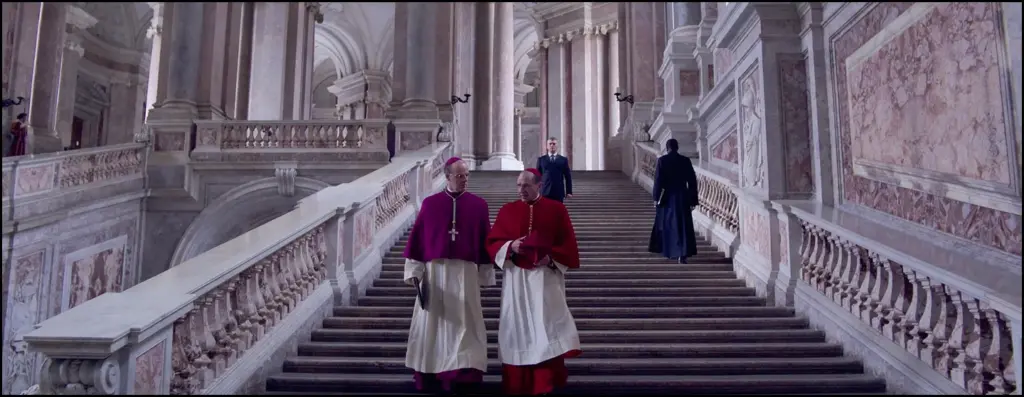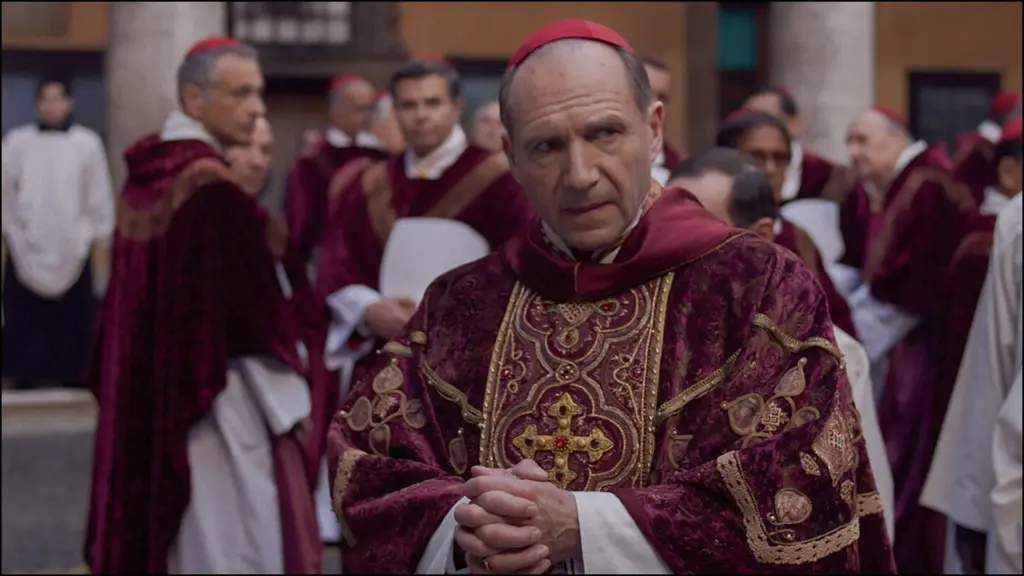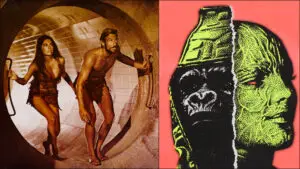Conclave, based on author Robert Harris‘s Vatican potboiler and directed by Edward Berger (All Quiet on the Western Front), is a deeply enjoyable film that takes a movie-ish, malarky-filled subject – the political agony and ecstasy of electing “the most famous man in the world” amid some of the planet’s most extreme decor – and pulls us into the sights and sounds and human feel of it. The result is a movie that’s better than it sounds, one that puts across a humane and thoughtful message through subtle, filmic means.
Like Aaron Burr, we all long to know what goes on in “the room where it happens.” (Few of us really want to be there, however. The mind-bending tedium of the cardinals’ voting procedure could be bearable only to persons with a tolerance for ritual built up through lifelong exposure.) The Sistine Chapel is the ultimate such room in the Western world. Harris’ book, and this movie, promise to show us what happens there – and ask us to believe that the outcome truly matters. The film’s advertising hype comes down heavy: “When Cardinal Lawrence is tasked with leading one of the world’s most secretive and ancient events, selecting a new Pope, he finds himself at the center of a conspiracy that could shake the very foundation of the Catholic Church.” Ooh boy. The Da Vinci Code here we come.
The supposedly foundation-shaking story – very loosely based on the surprise election of Francis in 2013 – begins with the sudden death of the old pope, whose opinions about his possible successors drive the drama. This is a potential problem for the movie, since he’s already a corpse when we meet him. We are able to evaluate the post-mortem pontiff’s goodness and wisdom only through the grief of those who were close to him, and we must get to know them before we can judge their characters.
Fortunately, chief among his mourners is his right-hand man, the dean of the College of Cardinals, played by Ralph Fiennes. From the opening scene – Fiennes hurrying miserably through a dark road tunnel on his way to the pope’s deathbed, his scarlet skullcap crumpled in his hand – to the last – him looking out of a high window, wearing no finery, watching excited little nuns-in-training leave to celebrate the election that has been his responsibility – the movie belongs to him. He’s in nearly every shot, often in extreme close-up, and it’s a testament to Fiennes’ skill and intelligence that we never grow tired of him.
Even as Fiennes is made to yammer about his religious doubts – a cliche of American TV and movies, where any character who’s tormented about faith must be Roman Catholic and needs to go sit in a photogenic church – he seems like a real person, and one worth knowing. His tears of sorrow at the deathbed, and later, his outright fit of sobbing alone in his marble-lined cell are absolutely convincing. As the story of Lawrence’s experience of the election, the film, despite its ponderous and in some ways silly scaffolding, succeeds.

On the way to the (frankly incredible) happy, progressive outcome, three candidates for pope rise in the vote, then fall as their fatal unsuitabilities for the big job are revealed. These straw men are played by fine actors (Stanley Tucci, John Lithgow, Lucian Msamati), but their personalities are barely sketched and their ascensions and disasters feel mechanical. The only really believable cardinal besides Fiennes’ Lawrence is the vain, reactionary Italian monster, Tedesco, played with gusto by Sergio Castellito. One glimpse of his scarlet iPhone case and you know the guy.
Lithgow is especially ill-served by the script – his rather confusing sub-plot involves simony, which a character starts to explain for the home audience as stealing from the church, only to be cut off. Every churchman knows what it is: Dante puts the simoniacs way, way down in the Eighth Circle.
So can a film that takes the business of electing a new pontiff nearly as seriously as the Catholic Church does possibly be good? And could we, mortally sick of politics as we are, enjoy it? The answer is, surprisingly, yes. Conclave, for all its story cliches, up to and including terrorists’ bombs going off on cue around the Vatican, is that exquisitely made. Italians value beauty highly, and the film is beautiful in the way only Italian-made things are. Even the bombing scene is lovely.
The visual language of the film is intimate, tactile, and enfolding. Extremely shallow focus, low light – all the shades are down for the sequestration of the cardinals – and profound attention to color and texture give the sumptuous red of the cardinals’ magnificent clothing a pulsing life of its own. (Isn’t the office more than the mortal man? And aren’t the robes the sign of office?)
The actors practically glow as they move through the cold black-and-white marble halls of the Vatican’s deeply weird luxury boot camp. Group bus rides, dining halls, narrow beds, priceless art: the feverish look of shows like The Borgias is nowhere in sight. This immersive, concentrated visual beauty is underscored by subtle sound design – we’re so close to these people that we hear breath held, fabrics rustle, chairs creak. Delicate music cues drift beneath quiet conversations that move fluidly from one language to another. Conclave is a triumph of sensuous movie-making.
It also succeeds, astonishingly, in making a heartfelt case for reformation of the church, not through the histrionic main plot but through what we observe of the army of silent, drably-dressed nuns tasked with the care and feeding of the cardinals. Isabella Rossellini, as the sister in charge, has only one pivotal, laser-pointed speech, but her focus and iron self-control, along with her grief for the dead pope, are written on her lovely, closed face. The scarcity of female characters and the paucity of Sister Agnes’ lines are not mistakes: if the movie showed us more of her, if she revealed more emotion and had more to say, it would misrepresent the profound subjugation of women in the church.
Because of Rossellini’s performance – and that final, understated shot of novices going out into the sunlight – the idea bubbles up that what we’ve witnessed does matter. And that thought stays in the mind.














